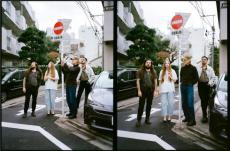Interview with Dry Cleaning about “Stumpwork”
NeoL / 2022年12月26日 17時0分
ハードエッジで伸縮の効いたギター・ロック・サウンドと、無機質でつぶやくような歌い回しが特徴的なヴォーカル。そのコントラストやコンビネーションが持ち味のドライ・クリーニングは、世代こそ少し上だが、ブラック・ミディやスクイッドと並んで近年のイギリスを代表する新進気鋭のロック・バンドの一角に挙げられる。そんなかれらのニュー・アルバム『Stumpwork』は、音楽面の「探求」を推し進めつつ、ユーモアとシリアスな警句が散りばめられたユニークで刺激的な作品だ。ジェンダーとアンビエント、サイケデリックと生春巻き、エンポリオ・アルマーニとダンス・ビート、インプロヴィゼーションとペットの亀……その落差や緩急、ハーモニーが生み出すダイナミズムこそ、ドライ・クリーニングの真骨頂と言えるだろう。
「自分を取り巻く世界に興味を抱き続けよう/できれば子供の頃の好奇心を持ち続けよう」。アルバムの最後の曲“Icebergs”でそう語りかけるヴォーカリストのフローレンス・ショウ。待望の初来日公演を控えた前日、メンバー4人に話を聞いた。
→ in English
――ドライ・クリーニングの曲は歌詞に食べ物がよく出てきますよね。パンケーキ、ソーセージ、ミックスサラダ、寿司、チョコレートムース、ポテトチップス……。
ニック「このバンドは食べ物を中心に回っているんだ(笑)」
フローレンス「インタヴューで聞かれるまで、そのことに気がつかなかった。みんなそのことを話題にするんだけど、私にとってはまったくの驚きで。歌詞の中に食べ物に言及することがこんなに多いなんて(笑)。食べ物のことはよく考えるよね。お腹が空くととても不機嫌になるし、毎日同じ時間に食事をとらないとストレスを感じる。食事を抜くと他のことを考えるのが難しくなる。体質みたいなもので、食べ物のことで頭がいっぱいなのかな(笑)。私は面白い食べ物が好き。イギリスで売られている『ビリー・ベア・ハム』という、熊の顔の形に潰されたハムがあって。素材は肉らしいんだけど(笑)、何でできているのかわからないような、そういうのが面白くて好きです」
ルイス「この取材に向かう途中も食べ物の話をしてたしね」
トム「僕らがバンドを始めた頃は、音楽を演奏するよりも食べ物の方が大事だった。このバンドは元々、社交的なものとして始まったんだ。よくたむろして、音楽を作って、食べ物を食べていたね」
――今回の新しいアーティスト写真の中にも、4人で食事をしている写真がありますね。食事中の会話から音楽のアイデアが生まれることもありますか。
ニック「音楽のことを忘れるには一番いい時間だと思う」
トム「食事には、共同体や儀式のような側面がある。そしてアイデアとは、無意識のうちに出てくるものなんだ。それはとても大事なことで、一緒にいて、なんとなく書いたりしているうちに頭の中でいろんなことが起こってくる。何かを書いたり、ジャムをしたりすると、それが頭の奥で浸透していき、別の何かが生まれたりする。だからそこで座って何を考えているかといえば、曲を書くことではなく、『このターキーサンドイッチはなかなかいいね』といったくらいのことなんだよ(笑)」
フローレンス「あのプレスショットは、“ドライ・クリーニングは食べ物が大好き”というテーマで撮られた写真みたいで面白いよね(笑)。ちょっとジョークみたいだけど、でも実際、食べることが好きなのは私たち自身だから」
――ただドライ・クリーニングの曲では、“食べる”描写はあまりないですよね。出てくる食材や料理は、美味しそうでもなければ、不味そうというわけでもない。即物的というか、静物画のような対象との距離感がドライ・クリーニングの音楽のクールな佇まいを象徴しているというか。
フローレンス「私は常に、他人が自分たちの音楽をどう捉えているのか知りたいと思っている。私自身、曲を書く際にそれがどのような役割を担っているのかについて自覚がないから。あくまで無意識のうちにやっていることなので、他人の意見を聞くのは楽しい。この前も誰かが言っていたんだけど、『食べ物のことを女性の声で話しているのが面白い』って。今までそう思ったことはなかったけど、でもここには明らかに、ある種の政治的な側面があるような気がする。よくはわからないんだけど……ただ私自身ほとんど意見を持っていないので、人々がこの作品をどう解釈して、そこから何を得るのかに興味がある」
――ちなみに、食べること、もしくは料理とのアナロジーでドライ・クリーニングの音楽を語ることってできたりしますか。
フローレンス「どうだろう? 私が料理をするときは、冷蔵庫にあるものを使って作るのが一番好き。レシピは嫌い。あれこれ指示されているような気がして(笑)」

――今回のニュー・アルバム『Stumpwork』は、デビュー作の『New Long Leg』に続いてジョン・パリッシュをプロデューサーに迎えて制作されています。ただ前作と比べて、スタジオでの「実験」に多くの時間が費やされたと聞きましたが。
ニック「面白いことに、僕たちはスタジオでの作業を表現するのに『実験』という言葉をよく使うんだ。ただ、言葉本来の意味での『実験(Experimenting)』とは違うと思う。僕たちがしたことは、どちらかというと、『探求(exploration)』に近いと思うんだ」
トム「かなり主観的な言葉だよね。誰かにとって実験的なことが、僕らにとっては必ずしも実験的であるとは限らない。今回、僕たちがサウンドでやった『実験』は、たとえば異なるコードを使ってオルガンやラップスティールやいろんな楽器を追加していくようなことだった。さまざまなエフェクトをかけたり、ペダルを変えたりしていろいろ試してみたんだ」
ニック「それは今回、(ロックダウンの影響で)時間的な余裕があったからこそ可能だった側面もある。そこにはある種の精神的な効果もあって、ロックフィールドにあるスタジオに行き、ジョンと一緒に仕事をするのは僕らにとってとても心地の良いことだったんだ。その根底には信頼という要素もあり、気心の知れたエンジニアやプロデューサーと一緒に仕事をできたのが大きかった。隔離された環境の中で、同じ部屋で過ごし、同じスタジオで作業し、同じものを食べるという。前回は2週間でアルバムを作らなければならなかったけど、今回は1カ月もかけることができた。その過程では困難なこともたくさんあったけど、でも一緒にいることで、その不安を頭の隅に追いやることができる。そうした恩恵が今回のアルバムでは大きかったと思う」
ルイス「メンタル的な部分だけでなくフィジカル的なことを言うと、今回は“遊び部屋”を用意したんだ。そこにはキーボード、パーカッション、サックスなどたくさんの楽器がいたるところにあり、ライヴを録音する一角とおもちゃ部屋みたいな部屋が混在しているような感じで。そこにいつでも好きな時に出入りして、遊んでいるような感覚で曲作りをすることができたんだ。あと天候の違いもあったと思う。最初のレコーディングの時は天気が良くて、外で卓球をしている時間が長かった。今回は少し寒くて雨が降っていたので、室内で過ごすことが多かったね」
――サウンド面で、今回のアルバムに持ち込みたかった新たなテイストや具体的なアイデア、表現したかったフィーリングみたいなものは何でしたか。
トム「今回は“スペース”が強調されていると思う。どうすればより多くのスペースを作ることができるのか、そこに関心があった。それと反対に、より短く、簡潔にわかりやすくすることも意識していた。だから、短くてシングル向きのものと、長めで広がりのあるものがある。その両極端の要素を押し出し、ドライ・クリーニングの世界をもう少しダイナミックなものにしようという狙いがあったね」
フローレンス「考えてみると、私たちがしている『実験』とは、リコーダーを使ったり、誰かにホーンを吹いてもらったりとか、とてもささやかなものだった。これが違うバンドだったら、16人にホルンを吹いてもらうみたいな感じだったかも。でも、そこはバンドの気質とも関係があると思う。私たちはマキシマリストではないから、きわめて思慮深く、ちょっとした付け加えをしたんだ」
――その「実験」ないし「探究」という部分において、今回のアルバムの中で最も手応えを感じた曲を挙げるとするなら何ですか。
フローレンス「たくさんあるけど、“Conservative Hell”とか?」
トム「いい例だね。あれは逆に、制作時間が足りなかったこその産物でもあって。最初にレコーディングした曲はかなりうまくいったので、ジョンが『2曲目をやろう』って言ったんだ。ジョンはニックに気持ち強めにバスドラムを叩くように指示して、ルイスと僕にはランチの前に何かやっておくようにと言った。そうしたシチュエーションはよくあることで、僕らはそこでいろんなことをやっていたんだ。ペダルを踏んだり、何かを試したりしていただけなんだけど、実は頭の中ではランチのことを考えていたんだ(笑)。だから僕らがリハーサルルームを出た時に、周りの人たちがそれをいいって思ったのは驚きだった。人は時に、物事をすぐに判断してしまい、その結果、興味を失ってしまうことがある。判断が鈍ると、逆に面白いものができるのかもしれないね」
フローレンス「実際にしなかったけれども、やろうとしたことのひとつに、児童合唱団を入れるというアイデアがあって。次のアルバムでは子供たちの合唱が聴けるかも(笑)」
――その“Conservative Hell”は、冒頭の「Good Wedding/Bad Wedding」という歌詞が印象的で、以前にメーガン妃を題材にして書かれた “Magic of Meghan”という曲を連想しました。“Conservative Hell”は前作に収録された“Unsmart Lady”同様に、社会に置かれた女性の立場や、女性に対する固定的な役割分担の意識について歌った曲でもあると思いますが、この曲が書かれた背景について教えてください。
フローレンス「前々からこういう歌詞が書きたくてノートにメモしていて。正直なところ、それはイギリスで起きた“何か恐ろしいこと”がきっかけになっているんだと思う。というのも、イギリスではもう10年以上、保守政権が続いている。かれらは毎週のように新しい酷いことをやっていて、それが頭にあった。この “保守的な地獄”について書きたいと思ったんです。本当はもっと気の利いたことを書きたいとも考えていたんだけど、結局例の書き溜めたノートに戻ってきて――タブロイド紙の見出しのような感じでアレだけど。それとイギリスだけではなく、今や世界中が“保守的な地獄”に陥っている状況について考えていた。ちょうどフランスの選挙でマリーヌ・ルペンが当選しそうになった頃で、それで思いついたんです。世界的に右傾化が進む状況について、ヨーロッパをはじめ世界中で右翼的な政権がどんどん誕生していることを訴えるようなものが書きたかった」
――ええ。
フローレンス「でも同時に、人生とはそれでも続いていくもの。結局のところ、私たちの日常は変わらない。恐ろしい政治的状況の中で、買い物をしたり、人の結婚式に出たりしなければいけない。そこに選択の余地はない。それであの曲では警察権力に触れ、『If you think this car’s dirty you should try a night with the driver(この車が汚いと思うなら、あの運転手と一晩一緒に過ごしてみなよ)』と書いたんです。そのフレーズはロックフィールドで料理人をしている人の車に貼ってあったバンパーステッカーを見て思いついたもの。私はこの国の責任者にショックを受けている。政府の中の人たちはいわばドライバーであり、責任者。かれらは本当にタチが悪い……そんなことを考えるうちに、バンパーステッカーのイメージと結びついて。そうやっていろいろ集めて一つにして曲ができた」

――今フローレンスが話してくれたような話題や問題意識について、メンバー内で話すような機会はありますか。食事の時は音楽のことは考えないということでしたが。
フローレンス「どうしてもそうなってしまうよね。今、国内では多くの新しい、そして恐ろしい動きがある。特に、ボートで海峡を渡ってくる人々については、まさにそうした状況の一つと言える。まるで絶え間なく繰り広げられる災害のようなもので。ケント州にあるマンストンという収容施設で起きた事件も本当にひどいものだった」
トム「誰かがそこに車で乗り付けて、ガソリン爆弾を投げつけて自殺したんだ。メディアと政府が反移民的な行動を許しているために、人々が移民を攻撃しているという現象が起きている。彼らは『亡命者』ではなく『移民』という言葉を使っていて、これは法的なトリックに過ぎないんだ。民主主義のために亡命を申請することは許されているけど、それを申請するために海峡を渡ってイギリスに行く合法的な方法はないんだよ」
フローレンス「英国の多くの人々は、海峡を渡って亡命を申請することは違法だと信じ込まされている。でも、そんなことはなくて、完全に合法的な行為。話がすっかり歪曲されてしまっている」
トム「それと、ウクライナや香港から助けを求めてくる人々もいて、亡命希望者の数が増えているという状況がある。けれど一方で、シリアの人々には同じことをしようとしない。シリアで起きたのと同じことがウクライナでも起きているのに、この2つの紛争に対する対応はまったく異なる。この国では実に不快なことが起こっているんだ。メディアの情報を鵜呑みにしていると、本当にひどいことになるよ」
フローレンス「とてもあからさまで、無視したいと思ってもできない。日々、制御不能な大きな出来事が起きている。そう、だから話さないわけにはいかない」
――そうした話を受けて聴くと“Liberty Log”も印象的です。「巨大な腐ったサッカーボール」「中華春巻を食べてジワジワと死ぬ危険を冒そう」という歌詞とか、時節柄どこか意味深に感じられて。
フローレンス「“Liberty Logs”の歌詞は『春巻き』が由来。ロックダウン中はレストランに行けないまま、9週目に入っていた。すでに頭がおかしくなっていたんだけど、新たなレベルの狂気に陥っていて。『生春巻きが食べたいなあ』と思いながら(笑)。当時はワクチン接種前の時代で、COVID‑19で亡くなる人が続出し、誰もその仕組みやリスクを理解していなかった。テイクアウトは安全かどうかという議論が盛んに行われ、BBCのニュースやウェブサイトでも取り上げられていた。テイクアウトは可能か不可能か、『商品が届いたら箱を掃除する必要があるかどうか』とか、延々と続く感じ。私自身、テイクアウトができるのかできないのか長い時間考え、怖さはあったけど、とにかく危険を冒してでもテイクアウトしたいって思ったのを覚えてる。生春巻きを食べたい気持ちがCOVID‑19に感染する恐怖を上回った(大笑い)」
――なるほど(笑)。
ニック「2年前の冬に鉄道のアーチの下でリハーサルしたときの録音が携帯電話に入っていて。ヴィクトリア時代に鉄道が建設された時の高架で、そのアーチの下のスペースがロンドンのあちらこちらで再利用されていてね。で、友人のひとりがそこを所有していて、パンデミックの時にそこでリハーサルをした。上を通る電車がうるさくて、凍えるほど寒かったけど、曲作りの期間中にちょくちょく出入りしていたんだ。トムが4トラックで素晴らしいギターループを作ってくれて、そこにいろんな音をフェードインさせて背景のレイヤーや全体の雰囲気を構築していった。その素材を“Liberty Log”のレコーディングでは使っている。元々はジャムのようなもので、3つのセクションに分かれていて長さも決まっていなかったので不確定な要素が多く、レコーディングにはかなり不安があった。でも、この曲はいろんな意味で即興的で、ワンテイクで作ったので、それが形となりレコードで聴けてとても嬉しいよ。リハーサルの時間があまりなかったのでまだライヴで演奏したことがなく、今回のツアーには間に合わなかったんだけど、来年のツアーではやれたらいいなと思っている。みんな大好きな曲だし、僕も大好きな曲のひとつなんだ」

photography Marisa Suda(https://www.instagram.com/marisatakesokphotos/)
text Junnosuke Amai(TW)
[caption id="attachment_118683" align="alignnone" width="300"]

Stumpwork by Dry Cleaning Album Cover 2022
Photography: Annie Collinge
Creative Direction: Rottingdean Bazaar[/caption]
Dry Cleaning
『Stumpwork』
(4AD / Beat Records)
Now on sale
国内盤CD
(解説・歌詞対訳付/ボーナス・トラック追加収録/先着特典タオル)¥2,200+税
BEATINK.COM:
https://www.beatink.com/products/detail.php?product_id=12859
TRACKLISTING
01.Anna Calls From The Arctic
02.Kwenchy Kups
03.Gary Ashby
04.Driver's Story
05.Hot Penny Day
06.Stumpwork
07.No Decent Shoes For Rain
08.Don't Press Me
09.Conservative Hell
10.Liberty Log
11.Icebergs
12.Sombre Two *Bonus Track for Japan
13.Swampy *Bonus Track for Japan

―― You might have been asked this question a lot, but why does your music include so many food references?
Nick: The band revolves around food.
Florence: That was something that I didn't notice until we did interviews. People would bring it up and it would be a total surprise to me. I never realized how often I mention food in my lyrics. I’m surprised that it is unusual.
Lewis: Yea, what else are you thinking about guys?
Florence: I am always surprised at how unusual it is. I think about food a lot. I get very grumpy when I am hungry and feel stressed out when I don’t have meals at the same time every day. If I skip a meal I find it very difficult to think about anything else. It’s like a structure thing that I like. I must just be preoccupied with food. Food can be really funny as well. I like funny food. There is ham you can get in the UK called Billy Bear Ham. It's like meat squashed into the shape of a bear’s face. I don’t know what it’s made of, supposed to be meat. Things like that I find funny.
Lewis: We talk about food a lot. On the way here we were talking about food.
Tom: When we started, food was what we did more than play music. It started as a social thing originally. We used to hang out and write music and eat food.
―― In your press release, there is a photo of you eating together. Do you think those moments inspire you? Do you talk about music during your meals?
Nick: I think it’s the best time to forget about music.
Tom: When you are eating there is a communal or ritual aspect. Certainly, if any ideas are going on, they are subconscious. That’s a really valuable thing to do because you can be together and you are kind of writing, everything is going on in the back of your head. If you wrote something or jam to something, it's percolating in the back of your head and it gives you something else. You are not sitting there thinking about writing, you are thinking about “This turkey sandwich is pretty good”.
Florence: We did those press shots and found it funny because we talked about food things and it's such a theme that Dry cleaning loves food. I mean everybody else eats food so I thought it was a bit of a joke. I was eating food and that’s our thing.
Tom: We are endorsed by supermarkets.
―― How would you explain 'Dry Cleaning' from the perspective of food? Do you think how you make music is related to how you prepare food or what you like?
Florence: My favourite way to cook is to make something from what is in the fridge.
Lewis: Mine is the complete opposite. For me, cooking is about shopping.
Florence: I don’t like recipes that much. I feel that I am being told what to do. I like the risk of “this could be disgusting” but hopefully it’s the opposite.
Lewis: I love going to the shop and getting all the ingredients. I have to have a recipe.
―― Food isn't just about eating. It is also about the relationship with it as an object. We can feel that through your music for Dry Cleaning as well.
Florence: I am always keen to hear what other people make of it. Cause I’m unaware of the role it has in writing. It’s a subconscious thing so that’s interesting. Somebody else was saying to me the other day, that it was a female voice talking about food. I never thought of that either. There is a vaguely political slot to it that I don’t know. I almost don’t have an opinion about this and I’m interested in what people make out of it.

―― For your new album, you worked with John Parish again. You said you had more time in the studio to do experimentation. What was happening in these studio sessions?
Nick: It’s a funny thing, we use the term experimentation a lot to describe our time in the studio.
Tom: It’s quite a subjective term. What experimenting to you doesn’t necessarily mean experimenting to us.
Nick: Experimenting is like scientific and it means keeping everything the same and changing one thing. We are more like an exploration I think.
Tom: It’s almost like experimenting with our sound, like adding instruments using different chords. We put different effects on them and made pedal changes and tried stuff.
Nick: It’s that element of having that extra time that allows us to do all that things. It has a mental effect, the idea of going to that studio, Rockfield, and working with John had an element of being comfortable and we try to push ourselves in certain ways. There was an element underneath that of trust where we knew who was working with, the engineers, the producers in the same very isolated environment. In the same room, working in the same studio, eating all the same foods. Because you have this extra time the anxiety is just not there. It could have been there previously where we had to make an album in two weeks, and we have a month this time. I won’t go too much into detail but there were so many challenging things within that but the default setting of being there, who we were with, putting all that anxiety in the back of my head. Which is cool. I benefit a lot from it.
Lewis: Physically we gave ourselves a lot of playrooms. It’s about the mixture between the live room where we recorded everything and the room behind it which was like a toy room; the keyboards, percussions, saxophones and instruments were everywhere. We would dip in a little bit and start playing. I think the weather made it different too. In the first record, it was nice, we spent a lot of time outside playing table tennis. This time it was a bit cold and rainy, we spent a lot of time inside. We should have brought the next album in the winter.
―― What were some of the new ideas, tastes or sounds you wanted in this new album?
Lewis: I think there is an emphasis on space. We were trying to look for ways to find more space. The opposite of that is to make things shorter, and straightforward. So, there are shorter single-type things and longer, more expansive things. It's about pushing those extremes and trying to make the Dry Cleaning world more dynamic.
Florence: The more I am thinking about it, the ways we are experimenting were quite small, like the recorder or getting somebody to play horns. A different band would have been like let's get sixteen people to play horns. The things we did were quite modest in a way but I think that has to do with the general temperament of the band. We are not really like maximalists so they were quite thoughtful small additions. The reason why we didn’t do things like that was just time but maybe we felt like we had the right. We were on an intimate scale.
―― In terms of exploration, do you have a song on the new album that you felt went well?
Everyone: So many.
Tom: That is a good example as well. That wasn’t productive time, it was a productive lack of time. We had the first bit pretty settled and John told us to go do the second bit. He told Nick to play the bass drum with a felt beater and told Louis and me to just go do something before lunch. It was just that this change of pace was pretty normal so we were just doing stuff. We were just running stuff through pedals and trying whatever but we were thinking about lunch. So when we walked out it was a surprise to us that everyone else thought it was good. Sometimes we judge things too quickly and it stops us to get interested in them. If you can suspend judgement on something you might get something interesting.
Florence: One thing we talked about, that we didn’t do, but should do was to get a children’s choir. You could expect a children’s choir in the next album.
―― The last part of “Conservative Hell” was very striking. The lyrics, in the beginning, reminded me of your previous song ‘Magic of Megan’. These are discussions about the roles of women and their position in society. Can you tell us about the background of this song?
Florence: Originally I wrote a note somewhere that I wanted to write a lyric like “Conservative Hell”. It’s probably the wake of something dreadful happening in the UK, to be honest. We've had a conservative government for more than a decade. They are always doing new awful things every week so it’s been on my mind. We were writing so I wanted to write something on this subject as ‘Conservative Hell’. I was trying to think of something more clever for ages, but in the end, I came back to the note because I thought it was quite funny. It sounds sort of like a tabloid headline. Instead of being very UK-centric, it was about the whole world being in a ‘Conservative Hell’ at this moment. It was around the time Marine Le Pen nearly won the elections for France and that’s why it came to my mind.
I also wanted to get out the idea that more right-wing governments are taking over Europe and the world but life goes on. It sort of enters your frame of reference now and then. There is something awful about having no choice yet having to carry on shopping and going to people’s weddings with a dreadful political backdrop.
So I was touching on police powers and the idea of “if you think this caused it, you should try not to with the driver”. This was a bumper sticker of someone cooking at Rockfield. It struck me about the people in charge of the country. The people in the government are the drivers, they are in charge. It’s like the UK’s rubbish but they are sort of worse. Since I was thinking about this, normal bumper stickers start to relate in my mind. That’s how I collect it all together.

―― Do you often have discussions about political issues over food? You did mention that you don’t think about music when eating.
Florence: It inevitably does. There are always new terrible terms. Particularly in the moment about people coming across the channel with boats. It’s a constant unfolding of disaster. There is a detention centre called ‘Manston’ in Kent.
Tom: Someone drove up to it and petrol-bombed it and killed themselves. The bomb wasn’t very successful but it did happen. It’s just a symptom of the media and the government allowing anti-migrant behaviour that people are attacking migrants. They are using the word ‘Migrant’ instead of ‘Asylum seekers’ where they are playing a legal trick. People are allowed to claim asylum due to Democracy but there is no legal way to cross the channel to be in England to claim it.
Florence: A lot of people in the UK have been made to believe that it is illegal to cross the channel to claim asylum but it is not. It is a legitimate way to do it. The narrative has been completely taken away.
Tom: There is also a double negative because the number of Asylum seekers has been going up since we have interwoven to help people in Ukraine and Hong Kong. However, we don’t extend the same things to Serians or people from war-torn countries even though we had a hand in those conflicts. We have a responsibility to those people but because we don’t speak the same language and racism uncomfortable things are happening in the UK. If you can see past the media it’s very ugly.
Florence: It’s very blatant as well. It’s impossible to ignore even if you wanted to. There are big stories every other week where something uncontrollable happens.
Tom: I mean the same thing that happened to Seria is happening in Ukraine. The response for both of those conflicts is completely different.
―― Can you explain how the song “Liberty Log” was written? There was an interesting phrase where you used the terms, ‘I will risk slow death for Chinese Spring roll’ and ‘Huge rotten football’. What was the idea behind that?
Nick: I’ve got recordings on my phone of when we rehearsed two winters ago under a railway arch. When railways were built in Victorian times, they were built elevated. These arches are now repurposed all over London. One of our friends has a venue and since it was shut during the pandemic we rehearsed there. The trains going over the top were loud and it was beyond freezing. The song first came out there but it went away and came around again throughout our writing period. Tom’s got a four-track tape recorder you record on a cassette tape. We have done quite a lot of work on it previously. Tom made some nice guitar loops on it and we were using it during the performance as the song was fading in different sounds to build up as a background layer. We used that on recording for Rockfield. It’s kind of a jam. We haven’t played it that much and it has three sections but they were quite indeterminant and had no set length. I was quite apprehensive about recording it because there was so much uncertainty. A lot of the time we work the anxiety out of those songs by setting them into stone but this one is very much an improvisation in many ways. We did it in one take and that’s what you hear on the record so I am very happy about that. We haven’t played it live yet because we haven’t had a lot of rehearsal time. We hope we have it ready for this tour. Everyone loves it and it’s one of my favourite songs.
Florence: The lyrics, ‘Liberty Logs’ came from the ‘Spring roll’. During the lockdown, you couldn’t go to restaurants and it was week 9. I was already going crazy but I was on a new level of madness. I was thinking about how much I wanted a spring roll. It was the pre-vaccine period when people were dying of covid and no one understood how it worked or who was at risk. There were a lot of discussions on if takeaways were safe or not and it was on BBC news. I remember I spent so much time thinking if I could get a takeaway or not and being too afraid to get one but I wanted to risk it anyway. The amount that I wanted was beyond my fear of getting covid.

photography Marisa Suda(https://www.instagram.com/marisatakesokphotos/)
text Junnosuke Amai(TW)
関連記事のまとめはこちら
https://www.neol.jp/music-2/
外部リンク
この記事に関連するニュース
-
スリーシェイク所属の早川大貴がクラウドネイティブ技術を推進するCNCF Ambassadorsに就任
PR TIMES / 2024年12月23日 10時45分
-
Shareholder Proposals to Japan Business Systems, Inc.
PR TIMES / 2024年12月22日 14時40分
-
【愛しとーと】国際機関ESQRの品質優秀ダイヤモンド賞「Quality Choice Prize 2024」を受賞!
PR TIMES / 2024年12月20日 13時45分
-
インバウンド向け相撲エンタテインメントショーホールTHE SUMO HALL日楽座OSAKA 初の海外公演を実施!インドで大成功!
PR TIMES / 2024年12月11日 15時15分
-
インバウンド向け相撲エンタテインメントショーホールTHE SUMO HALL日楽座OSAKA初の海外公演を実施!インドで大成功!
@Press / 2024年12月11日 15時0分
ランキング
-
1NHKが「紅白歌合戦」で受信料に言及のびっくり "スタエン抜き"でも盛り上がった印象だが…
東洋経済オンライン / 2025年1月8日 13時0分
-
2藤井聡太七冠、叡王奪還に向け好発進 叡王戦本戦トーナメント1回戦勝利 8冠独占目指す
産経ニュース / 2025年1月8日 17時44分
-
3三井住友銀行「初任給30万円」に引き上げに氷河期世代から恨み節…《実績あげた社員に還元して》の悲痛
日刊ゲンダイDIGITAL / 2025年1月8日 15時3分
-
4元ラブホテル従業員が明かす“不思議な出来事”。女性客から「仕事が終わったら、会いませんか?」誘いに応じると…
日刊SPA! / 2025年1月8日 15時48分
-
5一人ぼっちの母親と2人で新年を迎えるはずが…母のベッドで目撃した「とんでもない光景」に赤面!
女子SPA! / 2025年1月8日 15時45分
記事ミッション中・・・
記事にリアクションする
![]()
記事ミッション中・・・
記事にリアクションする

エラーが発生しました
ページを再読み込みして
ください










